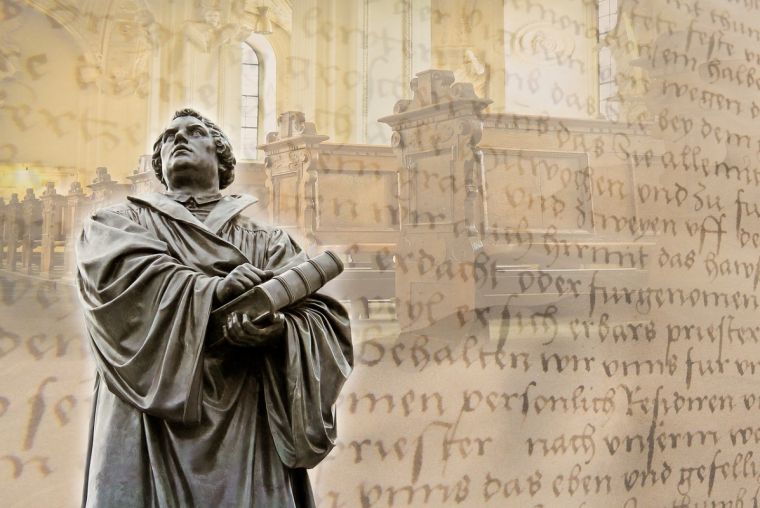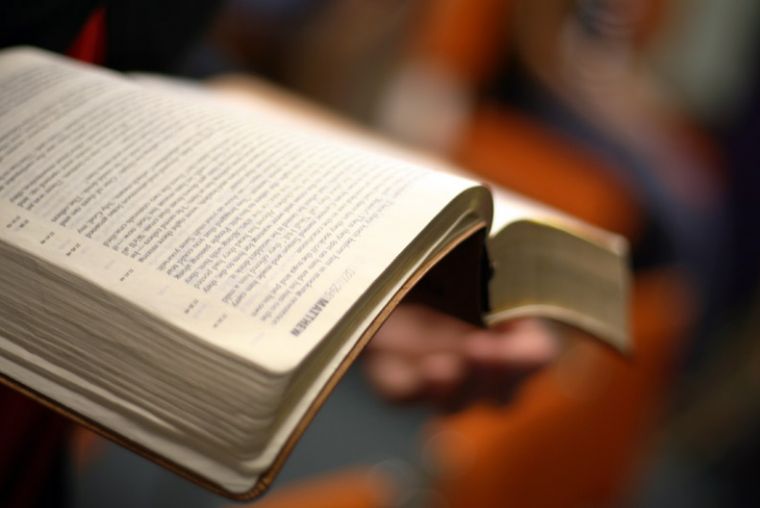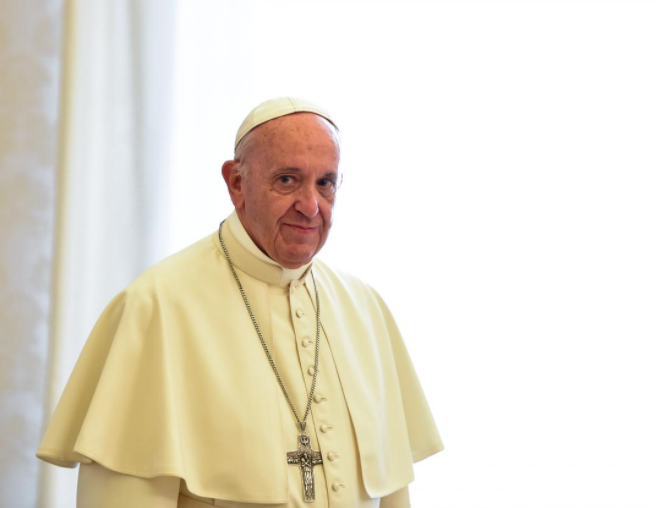500 years after the Reformation, can evangelicals and Catholics make up?
The language Catholics and Protestants have used about each other in the past, particularly evangelical Protestants, is quite extraordinary. Here's CH Spurgeon, for instance: 'We must warn with judicious boldness those who are inclined towards the errors of Rome; we must instruct the young in gospel truth, and tell them of the black doings of Popery in the olden times. We must aid in spreading the light more thoroughly through the land, for priests, like owls, hate daylight.'
That's one of his milder salvoes.

It is only in very recent times that evangelicals and Catholics have learned to be civil to each other; even back in the '80s I recall a church's participation in a Billy Graham rally being questioned by some because he made a practice of having local church leaders including Roman Catholics on the platform with him.
But in this season marking the 500th anniversary of the Reformation, is it time to bury the hatchet? Evangelicals and Catholics are, after all, co-belligerents on causes dear to the hearts of both. Both are generally opposed to homosexuality and transgenderism as well as sex outside marriage. Both are generally opposed to abortion and euthanasia. They can share platforms on this kind of cause – so are hostilities over?
Evangelicalism is fractious and not particularly coherent – even in the UK, it is divided into 'tribes' which may not have much common ground. The statement of faith of the Evangelical Alliance, for instance, is far too woolly for the Federation of Independent Evangelical Churches. But there is also a World Evangelical Alliance which acts as a global body, and it engages at a high level with other organisations such as the World Council of Churches – and the Roman Catholic Church.
'Challenges and Opportunities'
One of the fruits of its dialogue with the latter is a seven-year consultation (2009-2016) whose result has just been published. 'Scripture and Tradition' and 'the Church in Salvation': Catholics and Evangelicals Explore Challenges and Opportunities begins with a note on the status of the report, saying it is 'not an authoritative declaration' of either body. It speaks of the need for unity: 'We realize that in the history of the Church, continuing even to today, divisions have damaged the visible unity of the Church and shaken the credibility of the Gospel that is to be preached in the world.' Furthermore, it recognises that different parts of the world have different problems and that relations aren't the same in different places – where they are equally persecuted, for instance, hostilities tend to evaporate.

The document covers the status of Scripture in each tradition – is authority Scripture alone (evangelical) or Scripture and tradition (Catholic)? With appropriate reservations, it says both sides have come a long way since the Reformation. 'Catholics and Evangelicals rejoice in affirming together that the Scriptures are the highest authority in matters of faith and practice,' it says. There are words of encouragement and appreciation from each tradition to the other. But there are also 'fraternal questions of concern' on both sides, too, where the weaknesses of each tradition are probed.
And what about the dogmatic pronouncements of the Church since the 19th century on, for instance, the Immaculate Conception and the bodily assumption of Mary? These, the evangelicals say with masterly understatement, seem to have little if any biblical support.
There's a similar procedure regarding 'Apostolic Tradition' and 'Scripture and Tradition': common ground, valuing tradition, words of encouragement and fraternal questions of concern. In the second part, 'God's gift of salvation in the Church', the discussion are equally rich, but the questions are, if anything, more spiky. What about purgatory, ask the evangelicals? 'If you truly believe in an all-merciful and loving God who redeems us in Christ and that it is not by your merits that you are saved and salvation is given why do you continue to use the language of the treasury of merit, satisfaction, and indulgences?'
Yet out of these clear areas of disagreement come understandings of where, in fact, it isn't as great as all that – and where there is still disagreement, at least a good many misconceptions about what is actually believed has been cleared away, and an immensely fruitful conversation is being had.
Joint Declaration
This is the kind of conversation that has also led to the Joint Declaration on the Doctrine of Justification by the Lutheran World Federation and the Catholic Church in 1999, subsequently adopted by the World Methodist Council and the World Communion of Reformed Churches. The question of how someone was saved was at the root of the Reformation 500 years ago. Was it, as Luther argued, by grace through faith alone? Or was the Church involved as a gatekeeper who could (for a fee) hand out admission tickets? Theology moves on, old quarrels lose their heat and it turns out that in fact Catholics and Lutherans, or most of them – not everyone was convinced – could get along after all.
This did not, however, amount to an admission that they had been arguing over nothing. They agreed that the excommunications relating to the doctrine of justification set forth by the Council of Trent did not apply to the teachings of the Lutheran churches set forth in DDJ; likewise, the Lutherans acknowledged that the condemnations set forth in the Lutheran Confessions do not apply to the Catholic teachings on justification set forth in DDJ. In other words, both sides had learned more theology and were able to 'articulate a common understanding of our justification by God's grace through faith in Christ'.
As DDJ says: 'It does not cover all that either church teaches about justification; it does encompass a consensus on basic truths of the doctrine of justification and shows that the remaining differences in its explication are no longer the occasion for doctrinal condemnations.'
Anglicans too have associated themselves with DDJ, and today (October 31) the Archbishop of Canterbury is going to present Catholic and Lutheran representatives with copies of the Anglican response to the statement.
However: this sort of high-level theological engagement, involving highly skilled theologians who have several meetings over a period of years, does not necessarily convince everyone. In his book The Unquenchable Flame, for instance, British theologian Michael Reeves takes issue with DDJ and characterises it harshly. 'On the whole, when reading the Joint Declaration, it is quite hard to know what is being said, and one gets the impression that words are being used to paper over cracks rather than give clarity... Joint Declaration it may be, the curtain on the Reformation it is not.' And, he points out, the official Catechism of the Catholic Church 'contains doctrines that simply cannot be squared with a Reformational understanding of justification...no doctrine has been rescinded'.
Spanish objections
But given that the Joint Declaration has generally found wide acceptance, what about the World Evangelical Alliance/Roman Catholic document? It perceptively says that context varies widely throughout the world, and one response from the Spanish Evangelical Alliance illustrates this well. It says it views the WEA's approach to the Roman Catholic Church 'with a growing concern' shared by other national alliances; requests by Christian Today for further information received no reply. The statement by the Alianza Evangelica Espanola says Catholic doctrine 'has not subtantially changed in the last 500 years to correct the doctrinal errors that triggered the Reformation' and that 'the truth can never be subordinated to strategic issues'. It refers to questions of authority and the infallibility of the Pope, transubstantiation, the sacrifice of the Mass and the seven sacraments; the Catholic doctrines of salvation as defined by the Council of Trent and the use of indulgences; Marian doctrines, and prayers for the dead.

Furthermore, the Spanish evangelicals appear rather sceptical about Pope Francis's openness to evangelicals, whose numbers are rapidly increasing in Latin America at the expense of Catholics – they cannot accept his warnings against 'proselytism', they say, because they will never give up preaching the gospel
A response to the Alianza's critique was published by Evangelical Focus. Written by Thomas Schirrmacher, WEA associate secretary general for Theological Concerns, and Thomas K Johnson, the WEA's religious freedom ambassador to the Vatican. If there was any doubt that for some evangelicals relations with Roman Catholicism is still a live issue, this paragraph indicates the strength of feeling there is out there: 'We have been accused of entering into spiritual union with the Antichrist; some evangelicals have refused to participate in a meeting with us because we have shaken hands with Pope Francis.' Interestingly, they say wryly, 'our friendly meetings with Orthodox Christians, Muslims, Buddhists, Jains, Hindus, or Sikhs do not provoke similar criticisms'.
'Is the Reformation Over?'
However, Schirrmacher and Johnson are no shrinking theological violets. The have engaged in debate before with those who are keener to stress the differences between evangelicals and Catholics than their points of agreement. The Reformanda Initiative – of which Michael Reeves is a part – believes evangelicalism 'currently has an incoherent relationship with Roman Catholicism', which it says is 'a severely flawed system in need of a radical biblical reformation in its basic theology and practice'. It produced a 'Statement of Evangelical Convictions', 'Is the Reformation Over?' – a question designed to elicit the answer, 'No'. The leopard has not yet changed its spots. Catholics have noticed how many they are losing to evangelicalism, and are responding 'strategically' by adopting evangelical language; Catholics have not changed their minds about the authority of tradition; the Joint Declaration doesn't fundamentally change anything.
Schirrmacher and Johnson responded with an article entitled 'Let the Reformation Continue!' in which they said the Reformanda statement was 'not a sufficient description of our present theological situation'. No one had ever said the Reformation was over, evangelical convictions aren't being softened by dialogue with Catholics, implying Catholics were only interested in dialogue in order to reconvert evangelicals implied the Pope was a liar and was tantamount to bearing false witness, and Reformanda had just got the Joint Declaration wrong. Following this, Reformanda writers Leonardo De Chirico and Greg Pritchard published 'The Need for Clarification: Is the Reformation Over?' addressing Schirrmacher's and Johnson's points; there are helpful links to the whole debate.
The tone of these exchanges is generally polite but extremely frosty – frostier with each other, perhaps, than either would be with their common opponent. And while only those most dedicated to the debate will want to read all of these tens of thousands of words, through their emerging subtexts as much as anything, they do help to clarify a certain choice evangelicals – and Catholics – might have to make.
That is not so much about what is being discussed – though that is crucially important – but how it is being discussed. It's possible, after all, to engage in debate purely at a textual level, and argue about what different statements mean. That could be done entirely by email, and it is not likely to be very fruitful.
The other approach, however, is to look each other in the eye and acknowledge each other as sisters and brothers in Christ, and talk together with the assumption that the other person is speaking and acting with absolute integrity. In this way it sometimes happens that we find the gulfs between us are really just gullies to step over. It doesn't always happen, of course; sometimes that indispensable theological rigour requires us to acknowledge that we believe different things.
But there's all the difference in the world between approaching dialogue with our arms folded in suspicion of an enemy, and approaching it with our arms open to embrace a friend.
Follow Mark Woods on Twitter: @RevMarkWoods











